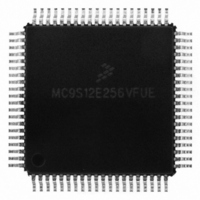MC9S12E256VFUE Freescale Semiconductor, MC9S12E256VFUE Datasheet - Page 257

MC9S12E256VFUE
Manufacturer Part Number
MC9S12E256VFUE
Description
IC MCU 256K FLASH 25MHZ 80-QFP
Manufacturer
Freescale Semiconductor
Series
HCS12r
Datasheet
1.MC9S12E256CFUE.pdf
(602 pages)
Specifications of MC9S12E256VFUE
Core Processor
HCS12
Core Size
16-Bit
Speed
25MHz
Connectivity
EBI/EMI, I²C, SCI, SPI
Peripherals
POR, PWM, WDT
Number Of I /o
60
Program Memory Size
256KB (256K x 8)
Program Memory Type
FLASH
Ram Size
16K x 8
Voltage - Supply (vcc/vdd)
2.35 V ~ 2.75 V
Data Converters
A/D 16x10b; D/A 2x8b
Oscillator Type
Internal
Operating Temperature
-40°C ~ 105°C
Package / Case
80-QFP
Processor Series
S12E
Core
HCS12
Data Bus Width
16 bit
Data Ram Size
16 KB
Interface Type
I2C, SCI, SPI
Maximum Clock Frequency
50 MHz
Number Of Programmable I/os
60
Number Of Timers
12
Maximum Operating Temperature
+ 105 C
Mounting Style
SMD/SMT
3rd Party Development Tools
EWHCS12
Minimum Operating Temperature
- 40 C
On-chip Adc
10 bit, 16 Channel
On-chip Dac
8 bit, 2 Channel
Package
80PQFP
Family Name
HCS12
Maximum Speed
50 MHz
For Use With
M68EVB912E128 - BOARD EVAL FOR MC9S12E128/64
Lead Free Status / RoHS Status
Lead free / RoHS Compliant
Eeprom Size
-
Lead Free Status / Rohs Status
Details
Available stocks
Company
Part Number
Manufacturer
Quantity
Price
Company:
Part Number:
MC9S12E256VFUE
Manufacturer:
Freescale Semiconductor
Quantity:
10 000
- Current page: 257 of 602
- Download datasheet (4Mb)
8.4.1
This module provides the capability of transmitting narrow pulses to an IR LED and receiving narrow
pulses and transforming them to serial bits, which are sent to the SCI. The IrDA physical layer
specification defines a half-duplex infrared communication link for exchange data. The full standard
includes data rates up to 16 Mbits/s. This design covers only data rates between 2.4 kbits/s and
115.2 kbits/s.
The infrared submodule consists of two major blocks: the transmit encoder and the receive decoder. The
SCI transmits serial bits of data which are encoded by the infrared submodule to transmit a narrow pulse
for every 0 bit. No pulse is transmitted for every 1 bit. When receiving data, the IR pulses should be
detected using an IR photo diode and transformed to CMOS levels by the IR receive decoder (external
from the MCU). The narrow pulses are then stretched by the infrared submodule to get back to a serial bit
stream to be received by the SCI. The polarity of transmitted pulses and expected receive pulses can be
inverted so that a direct connection can be made to external IrDA transceiver modules that uses active low
pulses.
The infrared submodule receives its clock sources from the SCI. One of these two clocks are selected in
the infrared submodule in order to generate either 3/16, 1/16, 1/32, or 1/4 narrow pulses during
transmission. The infrared block receives two clock sources from the SCI, R16XCLK, and R32XCLK,
which are configured to generate the narrow pulse width during transmission. The R16XCLK and
R32XCLK are internal clocks with frequencies 16 and 32 times the baud rate respectively. Both
R16XCLK and R32XCLK clocks are used for transmitting data. The receive decoder uses only the
R16XCLK clock.
8.4.1.1
The infrared transmit encoder converts serial bits of data from transmit shift register to the TXD pin. A
narrow pulse is transmitted for a 0 bit and no pulse for a 1 bit. The narrow pulse is sent in the middle of
the bit with a duration of 1/32, 1/16, 3/16, or 1/4 of a bit time. A narrow high pulse is transmitted for a 0 bit
when TXPOL is cleared, while a narrow low pulse is transmitted for a 0 bit when TXPOL is set.
8.4.1.2
The infrared receive block converts data from the RXD pin to the receive shift register. A narrow pulse is
expected for each 0 received and no pulse is expected for each 1 received. A narrow high pulse is expected
for a 0 bit when RXPOL is cleared, while a narrow low pulse is expected for a 0 bit when RXPOL is set.
This receive decoder meets the edge jitter requirement as defined by the IrDA serial infrared physical layer
specification.
8.4.2
The SCI uses the standard NRZ mark/space data format. When Infrared is enabled, the SCI uses RZI data
format where 0s are represented by light pulses and 1s remain low. See
Freescale Semiconductor
Infrared Interface Submodule
Data Format
Infrared Transmit Encoder
Infrared Receive Decoder
MC9S12E256 Data Sheet, Rev. 1.08
Chapter 8 Serial Communication Interface (SCIV4)
Figure
8-12.
257
Related parts for MC9S12E256VFUE
Image
Part Number
Description
Manufacturer
Datasheet
Request
R
Part Number:
Description:
Manufacturer:
Freescale Semiconductor, Inc
Datasheet:
Part Number:
Description:
Manufacturer:
Freescale Semiconductor, Inc
Datasheet:
Part Number:
Description:
Manufacturer:
Freescale Semiconductor, Inc
Datasheet:
Part Number:
Description:
Manufacturer:
Freescale Semiconductor, Inc
Datasheet:
Part Number:
Description:
Manufacturer:
Freescale Semiconductor, Inc
Datasheet:
Part Number:
Description:
Manufacturer:
Freescale Semiconductor, Inc
Datasheet:
Part Number:
Description:
Manufacturer:
Freescale Semiconductor, Inc
Datasheet:
Part Number:
Description:
Manufacturer:
Freescale Semiconductor, Inc
Datasheet:
Part Number:
Description:
Manufacturer:
Freescale Semiconductor, Inc
Datasheet:
Part Number:
Description:
Manufacturer:
Freescale Semiconductor, Inc
Datasheet:
Part Number:
Description:
Manufacturer:
Freescale Semiconductor, Inc
Datasheet:
Part Number:
Description:
Manufacturer:
Freescale Semiconductor, Inc
Datasheet:
Part Number:
Description:
Manufacturer:
Freescale Semiconductor, Inc
Datasheet:
Part Number:
Description:
Manufacturer:
Freescale Semiconductor, Inc
Datasheet:
Part Number:
Description:
Manufacturer:
Freescale Semiconductor, Inc
Datasheet:











